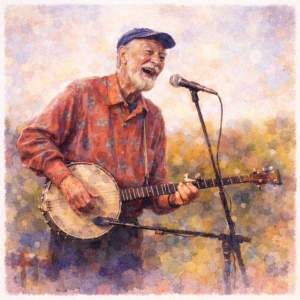~ Pete Seeger
 Called “America’s tuning fork” by poet Carl Sandburg, folk legend and activist Pete Seeger (1919–2014),
born in New York, taught the world about life through his
music, and helped popularize folk singing alongside his friend,
Woody Guthrie.
Called “America’s tuning fork” by poet Carl Sandburg, folk legend and activist Pete Seeger (1919–2014),
born in New York, taught the world about life through his
music, and helped popularize folk singing alongside his friend,
Woody Guthrie.
The son of Juilliard music professors, he left Harvard in 1938 to discover America — hitchhiking and riding the rails.
“Everybody’s got a right to their opinion,” said the five-string banjo player. With a lifetime commitment to the environment, peace, and justice, his songs carried history, humor, and advocacy — often with rousing sing-along choruses.
“An artist, any kind of artist, is also a citizen and has a citizen’s responsibilities,” Seeger once said.
Upon Seeger’s 1996 induction into the Rock and Roll Hall of Fame, Harry Belafonte said he would nominate Pete Seeger for a fifth face on Mount Rushmore — a tribute to the scale of his goodness and influence.
Blacklisted in the 1950s for his protest songs and locked out of major labels, Seeger’s work still traveled — carried by other voices. In 1962, Peter, Paul and Mary brought his labor anthem If I Had a Hammer to the charts, and the Kingston Trio recorded the antiwar song Where Have All the Flowers Gone.
“We got to get over the idea that if you’re not reaching millions, you’re a failure… We can be quite small and still be something,” said the man who trusted the power of music to bring about social change, and who played at rallies supporting Martin Luther King, Jr. and others.
In 1966, Seeger founded the Hudson River Sloop Clearwater organization. Through education, advocacy, and community celebration, it helped awaken public care for the Hudson River and the waters that sustain us.
“The artist in ancient times inspired, entertained, and educated,” he said. “Modern artists have an additional responsibility — to encourage others to be artists.”
 Let your song carry peace. 🌎🎶
Let your song carry peace. 🌎🎶
